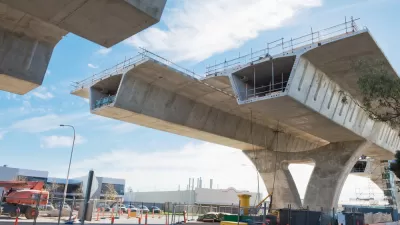A five-year transportation bill has advanced in the House, but it has a long way to go before Americans should expect to see a final federal transportation policy emerge from Congress.

"Democrats on a House committee voted late Thursday to send a far-reaching transportation bill to the full House, a key milestone in a process that faces an uncertain future," reports Michael Laris.
The five-year, nearly $500 billion funding bill, called the Invest in America Act, moves from the House Transportation Committee after two days of debate, according to Laris.
Transportation Committee Chairman Peter A. DeFazio (D-Ore.) is touting the bill as progress toward a more environmentally-friendly approach to transportation planning and investment in the United States. According to Laris's explanation, the bill "puts more importance on maintaining failing roads and bridges than on building new highway capacity, and has as a central goal of reducing transportation-related pollution, the nation’s top source of greenhouse gases causing climate change."
Republicans on the committee oppose the new direction reflected in the bill, calling it the "My Way or the Highway Bill."
Advocates like Yonah Freemark, on the other hand, have criticized the bill for spending far more on highways than on public transit, making it a climate bill in soundbites only. The New Urban Mobility alliance (NUMO), a coalition joining Lime, Lyft, the North American Bikeshare Association, Spin, Transit app, TransitScreen, Transportation for America, Uber and Via, sent to a letter to Congress before the bill passed committee asking for the five-year bill to do more in ensuring safe, equitable access to public transit and micomobility.
As noted by Laris, the House version of the bill is likely to undergo some significant changes to reconcile with any bill likely to pass in the Senate.
FULL STORY: Sweeping transportation bill, with focus on cutting pollution, sent to full House

Maui's Vacation Rental Debate Turns Ugly
Verbal attacks, misinformation campaigns and fistfights plague a high-stakes debate to convert thousands of vacation rentals into long-term housing.

Planetizen Federal Action Tracker
A weekly monitor of how Trump’s orders and actions are impacting planners and planning in America.

San Francisco Suspends Traffic Calming Amidst Record Deaths
Citing “a challenging fiscal landscape,” the city will cease the program on the heels of 42 traffic deaths, including 24 pedestrians.

Adaptive Reuse Will Create Housing in a Suburban Texas Strip Mall
A developer is reimagining a strip mall property as a mixed-use complex with housing and retail.

Study: Anti-Homelessness Laws Don’t Work
Research shows that punitive measures that criminalized unhoused people don’t help reduce homelessness.

In U.S., Urban Gondolas Face Uphill Battle
Cities in Latin America and Europe have embraced aerial transitways — AKA gondolas — as sustainable, convenient urban transport, especially in tricky geographies. American cities have yet to catch up.
Urban Design for Planners 1: Software Tools
This six-course series explores essential urban design concepts using open source software and equips planners with the tools they need to participate fully in the urban design process.
Planning for Universal Design
Learn the tools for implementing Universal Design in planning regulations.
Heyer Gruel & Associates PA
JM Goldson LLC
Custer County Colorado
City of Camden Redevelopment Agency
City of Astoria
Transportation Research & Education Center (TREC) at Portland State University
Jefferson Parish Government
Camden Redevelopment Agency
City of Claremont




























